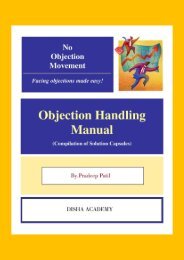INDIAN TRUST ACT 1882 BY.PRADEEP PATIL
UNDERSTANDING TRUST IN NOW A DAYS IMPORTANT FOR MARKETING FORCE OF LIFE INSURANCE
UNDERSTANDING TRUST IN NOW A DAYS IMPORTANT FOR MARKETING FORCE OF LIFE INSURANCE
You also want an ePaper? Increase the reach of your titles
YUMPU automatically turns print PDFs into web optimized ePapers that Google loves.
(c) Becomes aware of a breach of trust committed or intended to be committed, and either<br />
actually conceals it, or does not within a reasonable time take proper steps to protect the interests<br />
of the other beneficiaries, or<br />
(d) Has deceived the trustee and thereby induced him to commit a breach of trust, the other<br />
beneficiaries are entitled to have all his beneficial interest impounded as against him and all two<br />
claim under him (otherwise than as transferees for consideration without notice of the breach)<br />
until the loss caused by the breach has been compensated.<br />
When property has been transferred or bequeathed for the benefit of a married woman, so that<br />
she shall not have power to deprive herself of her beneficial interest, nothing in this section<br />
applies to such property during her marriage.<br />
69. Rights and liabilities of beneficiary's transferee - Every person to whom a beneficiary<br />
transfers his interest has the rights, and is subject to the liabilities, of the beneficiary in respect of<br />
such interest at the date of the transfer.<br />
CHAPTER VII - OF VACATING THE OFFICE OF <strong>TRUST</strong>EE<br />
70. Office how vacated - The office of a trustee is vacated by his death or by his discharge from<br />
his office.<br />
71. Discharge of trustee - The trustee may be discharged from his office only as follows:- (a)<br />
By the extinction of the trust;<br />
(b) By the completion of his duties under the trust;<br />
(c) By such means as may be prescribed by the instrument of trust;<br />
(d) By appointment under this Act of a new trustee in his place;<br />
(e) By consent of himself and the beneficiary, or, where there are more beneficiaries than one, all<br />
the beneficiaries being competent to contract; or<br />
(f) By the Court to which a petition for his discharge is presented under this Act.<br />
72. Petition to be discharged from trust - Notwithstanding the provisions of Section 11, every<br />
trustee may apply by petition to a principal Civil Court of original jurisdiction to be discharged<br />
from his office; and if the Court finds that there is sufficient reason for such discharge, it may<br />
discharge him accordingly, and direct his costs to be paid out of the trust-property. But where<br />
there is no such reason, the Court shall not discharge him, unless a proper person can be found to<br />
take his place.


















